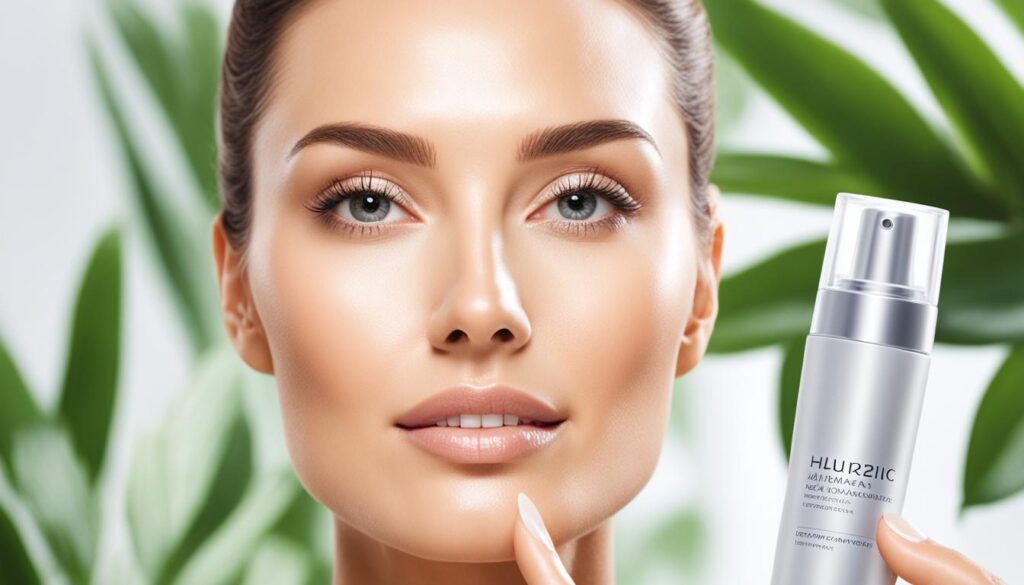When it comes to maintaining healthy skin, many individuals are turning to natural skincare products that harness the power of key ingredients. One such ingredient that has gained popularity in recent years is hyaluronic acid. This versatile molecule offers a range of health benefits, making it a must-have addition to your beauty routine.
Hyaluronic acid is a natural substance found in the body that has the remarkable ability to hold water. In fact, it can hold up to one and a half gallons of water, making it a highly effective moisturizer. By incorporating hyaluronic acid into your skincare regimen, you can experience improved hydration and a more youthful, radiant complexion.
Not only does hyaluronic acid provide moisturizing properties, but it also plays a vital role in tissue growth and wound healing. This remarkable substance acts as a scaffold structure within the body, aiding in the regeneration of tissues and promoting faster healing. Ongoing scientific studies continue to explore the potential uses of hyaluronic acid in various applications.
Whether you want to enhance your skin’s health, improve joint mobility, or support ocular wellness, hyaluronic acid offers numerous benefits for overall health and beauty. Its natural properties make it a preferred ingredient in many skincare products, and ongoing research is unveiling the full potential of this remarkable molecule.
Key Takeaways:
- Hyaluronic acid is a versatile and natural substance that offers numerous health benefits.
- It provides deep hydration to the skin, resulting in a more youthful and radiant complexion.
- Hyaluronic acid aids in tissue growth and wound healing, making it beneficial for overall wellness.
- Studies are ongoing to explore the various potential uses of hyaluronic acid in skincare, joint health, ocular health, and more.
- By incorporating hyaluronic acid into your beauty routine, you can experience the transformative power of this remarkable molecule.
How Does Hyaluronic Acid Work?
Hyaluronic acid, a naturally occurring substance in the body, works through its unique molecular structure. Consisting of long, chain-like molecules called polymers, hyaluronic acid has specific spots where other compounds, such as water, can attach. This allows it to hold a significant amount of water, making it a valuable ingredient in moisturizing products.
But hyaluronic acid does more than just hydrate the skin. Its versatile structure enables it to transport other molecules and bind to cells, making it useful for targeted delivery of medications to specific areas of the body. Additionally, its scaffold-like properties contribute to tissue growth and wound healing.
Scientific studies are continuously exploring the potential uses of hyaluronic acid in various fields, including skincare, targeted drug delivery, tissue engineering, and wound care.
“Hyaluronic acid’s unique molecular structure allows it to hold a large amount of water, making it an effective ingredient in moisturizing products.”
In skincare, hyaluronic acid’s moisturizing properties help improve skin hydration and combat dryness, resulting in a smoother and more supple complexion. Its ability to bind water molecules helps plump up the skin, reducing the appearance of fine lines and wrinkles.
Furthermore, hyaluronic acid’s targeted delivery capabilities make it a promising tool in the field of medicine. By attaching to specific cells, it can aid in the delivery of drugs directly to the affected areas, maximizing therapeutic effects while minimizing potential side effects.
| Benefit | Explanation |
|---|---|
| Skin Moisturization | Hyaluronic acid’s water-binding ability helps hydrate the skin, promoting a healthy, glowing complexion. |
| Targeted Drug Delivery | By attaching to specific cells, hyaluronic acid enhances the targeted delivery of medications. |
| Tissue Growth and Wound Healing | Hyaluronic acid’s scaffold-like structure aids in tissue growth and accelerates the wound healing process. |
With its remarkable properties and ongoing scientific studies, hyaluronic acid continues to demonstrate its potential as a valuable compound in various industries. From the skincare industry to targeted drug delivery and tissue engineering, hyaluronic acid shows promise in improving health and well-being through its unique molecular structure.
Health Benefits of Hyaluronic Acid for Skin
Long-term use of hyaluronic acid can greatly improve the health and appearance of your skin. This remarkable substance has the ability to increase flexibility, elasticity, and hydration, making it a popular ingredient in skincare products. Hyaluronic acid is known for its anti-aging properties, as it helps to reduce the appearance of fine lines and wrinkles, promoting a more youthful and radiant complexion.
The moisturizing properties of hyaluronic acid play a key role in its effectiveness for improving skin health. By providing intense hydration, it helps to replenish moisture levels and maintain a healthy skin barrier. This is crucial for preventing dryness, flakiness, and dullness, which are common signs of skin aging.

With regular use, hyaluronic acid can restore and rejuvenate your skin, leaving it soft, supple, and visibly plumper. It enhances the skin’s natural ability to retain moisture, improving overall hydration levels and promoting a more youthful complexion.
The Benefits of Hyaluronic Acid for Skin:
- Increases flexibility and elasticity
- Provides deep hydration
- Reduces the appearance of fine lines and wrinkles
- Promotes soft and smooth skin
- Enhances the skin’s natural moisture retention
- Improves overall skin health and appearance
“Hyaluronic acid is a game changer for skin health. Its ability to deeply hydrate and plump the skin makes it an essential ingredient for any anti-aging skincare routine.” – Dr. Samantha Johnson, Dermatologist
Hyaluronic Acid for Joint Health
Hyaluronic acid plays a crucial role in supporting joint health by acting as a major component of joint fluid. It serves as a cushion between the bones, providing lubrication and shock absorption, which helps prevent or reduce joint pain. This makes hyaluronic acid an essential molecule for maintaining healthy and pain-free joints.
For individuals with arthritis or soft tissue injuries, hyaluronic acid injections can be a viable treatment option. In particular, knee osteoarthritis patients often find relief through these injections when other treatments have been ineffective. Hyaluronic acid injections provide pain relief, improve joint mobility, and promote overall joint health.
These injections typically last for a period ranging from six months to a year, allowing patients to experience sustained pain relief and improved joint function. Ongoing research endeavors aim to further explore the potential benefits of hyaluronic acid for other joint-related conditions and injuries, expanding its applications and enhancing the quality of life for a broader range of individuals.
Expert Quote:
“Hyaluronic acid injections have emerged as an effective therapeutic option for individuals with knee osteoarthritis. These injections help alleviate joint pain and enhance joint mobility, improving the overall quality of life for patients.” – Dr. Sarah Thompson, Rheumatologist.
Hyaluronic Acid Injection Benefits for Joint Health
| Treatment Benefits | Description |
|---|---|
| Pain Relief | Hyaluronic acid injections provide relief from joint pain associated with arthritis and soft tissue injuries. |
| Improved Joint Mobility | By lubricating the joints and enhancing cushioning, hyaluronic acid injections improve joint mobility. |
| Long-lasting Effects | These injections offer pain relief and improved joint function lasting from six months to a year. |
| Expanded Treatment Options | Ongoing research explores the potential benefits of hyaluronic acid for various joint-related conditions and injuries. |
Hyaluronic Acid for Eye Health
Hyaluronic acid plays a vital role in maintaining the health of our eyes. As a naturally occurring substance in the body, it helps in keeping the eyes lubricated, promoting optimum eye health. One of the common uses of hyaluronic acid is in the treatment of dry eyes, a condition where the eyes lack proper lubrication.
In the treatment of dry eyes, hyaluronic acid can be applied through eye drops or taken orally as supplements. The moisturizing properties of hyaluronic acid help in relieving the discomfort associated with dry eyes, providing soothing relief and restoring proper lubrication to the eyes.
In addition to treating dry eyes, hyaluronic acid is also beneficial during various surgical procedures involving the eyes. For example, during cataract removal or corneal transplant surgeries, hyaluronic acid is used to improve tear production and promote faster ocular recovery. Its ability to enhance the natural lubrication of the eyes aids in the healing process, ensuring a smoother and more successful surgical outcome.
The Benefits of Hyaluronic Acid for Eye Health:
- Provides relief from dry eyes
- Restores proper lubrication to the eyes
- Improves tear production
- Promotes faster ocular recovery after surgery
With its ability to maintain eye lubrication, hyaluronic acid proves to be a valuable component in enhancing overall eye health and comfort. Whether it’s treating dry eyes or aiding in surgical procedures, hyaluronic acid plays a crucial role in promoting optimal eye health and well-being.
| Hyaluronic Acid for Eye Health | Benefits |
|---|---|
| Relief from dry eyes | Hydration and lubrication of the eyes |
| Tear production | Improved tear quality and quantity |
| Ocular recovery after surgery | Promotes faster healing and reduces discomfort |

Hyaluronic Acid for Overall Health
While hyaluronic acid is well-known for its benefits in skincare, joint health, and eye health, it also holds significant potential for promoting overall well-being. Research suggests that this remarkable molecule can have positive effects on various aspects of our health, including bone health, respiratory conditions, and bladder pain.
Enhancing Bone Health
Hyaluronic acid plays a crucial role in stimulating the production of new bone cells, making it an important component for maintaining healthy bones. By supporting bone growth and regeneration, it can contribute to improving overall bone health and integrity.
Treating Respiratory Conditions
Emerging studies indicate that hyaluronic acid may effectively treat respiratory conditions such as asthma and chronic obstructive pulmonary disease (COPD). This versatile molecule has the potential to alleviate symptoms, enhance lung function, and improve the quality of life for individuals with these conditions.
Managing Bladder Pain
Hyaluronic acid shows promise as a treatment option for bladder pain, particularly pain caused by interstitial cystitis. This painful condition can significantly impact a person’s quality of life, and hyaluronic acid may offer relief by reducing inflammation and restoring bladder function.
Incorporating hyaluronic acid into our holistic approach to health can yield remarkable benefits. Its ability to enhance bone health, alleviate respiratory conditions, and manage bladder pain underscores its versatility and potential impact on overall well-being.
References:
- “Hyaluronic Acid in Bone: How Willing Are We?: A Systematic Review.” – Journal of Orthopaedic Research
- “Hyaluronic Acid and Respiratory System: A Comprehensive Review.” – Immune Network
- “Intravesical Instillation of Hyaluronic Acid: Clinical Evidence and Practical Aspects.” – European Urology
Safety of Hyaluronic Acid
Hyaluronic acid is generally considered safe when used appropriately. As with any medication or supplement, it is important to prioritize safety and consult with a healthcare provider before incorporating hyaluronic acid into your routine.
Over-the-counter products and supplements: Over-the-counter hyaluronic acid products and supplements are generally safe for use. However, it is always advisable to consult with a healthcare provider before starting any new skincare or health regimens, especially if you have any underlying medical conditions or are taking other medications.
Prescription hyaluronic acid products: Prescription-grade hyaluronic acid products should be taken according to the instructions provided by your healthcare provider. These products are typically more concentrated and are used to target specific health concerns. It is important to follow your healthcare provider’s guidance to ensure safe and effective use.
Hyaluronic acid injections: Injections of hyaluronic acid should only be administered by licensed medical professionals. This is to ensure precise and safe placement of the injections, as well as to minimize the risk of complications. It is crucial to seek treatment from a licensed and qualified medical professional to ensure your safety and optimal results.
Individual reactions and allergies to hyaluronic acid products may occur. If you experience any adverse effects or have concerns about your reaction to hyaluronic acid, it is important to consult with your healthcare provider promptly.
When to Consult a Healthcare Provider
When considering the use of hyaluronic acid as a supplement or treatment option, it is essential to consult a healthcare provider. They possess the expertise to guide you on the appropriate use of hyaluronic acid for various conditions, including skin health, eye health (such as dry eyes), joint health (like arthritis), wound healing, bladder pain (such as interstitial cystitis), and respiratory conditions like asthma. Seeking the advice of a healthcare provider ensures personalized recommendations and tailored courses of action based on your individual needs.
| Condition | Why Consult a Healthcare Provider |
|---|---|
| Skin Health | A healthcare provider can assess your skin health and determine the best approach for incorporating hyaluronic acid into your skincare routine. |
| Eye Health | If you have dry eyes or any other eye conditions, a healthcare provider can evaluate your specific situation and advise you on the appropriate use of hyaluronic acid for eye health. |
| Joint Health | Consulting a healthcare provider is crucial for joint-related concerns like arthritis, as they can recommend the most suitable treatment options involving hyaluronic acid. |
| Wound Healing | A healthcare provider can assess the nature of your wound and provide guidance on the use of hyaluronic acid to support efficient healing. |
| Bladder Pain | If you experience bladder pain, particularly associated with interstitial cystitis, a healthcare provider can offer specialized advice on utilizing hyaluronic acid for pain management. |
| Respiratory Conditions | For respiratory conditions such as asthma, consulting a healthcare provider is essential to explore the potential benefits and appropriate usage of hyaluronic acid. |
Using Hyaluronic Acid in Skincare
Hyaluronic acid is a popular ingredient in skincare products, including serums, creams, and gels, due to its numerous benefits for the skin. When applied topically, hyaluronic acid can help reduce the appearance of fine lines and wrinkles, giving the skin a smoother and more youthful appearance. It works by attracting and retaining moisture, effectively plumping the skin and providing deep hydration.
One of the main advantages of hyaluronic acid in skincare is its ability to boost collagen production. Collagen is a key protein that helps maintain the skin’s firmness and elasticity. As we age, collagen levels naturally decline, resulting in the formation of wrinkles and sagging skin. By stimulating collagen synthesis, hyaluronic acid helps to combat these signs of aging, promoting a firmer and more supple complexion.
In addition to its anti-aging properties, hyaluronic acid is also highly moisturizing. It has the ability to hold up to 1000 times its weight in water, making it an excellent hydrator for dry and dehydrated skin. By replenishing the skin’s moisture barrier, hyaluronic acid leaves the skin feeling soft, smooth, and plump.
Furthermore, some dermatologists use hyaluronic acid as a dermal filler for cosmetic purposes, such as filling in wrinkles and adding volume to the face. These dermal filler treatments can help enhance facial contours and restore a more youthful appearance.
It’s important to note that while over-the-counter skincare products containing hyaluronic acid can be beneficial, the use of dermal fillers should always be performed by a qualified and experienced healthcare professional.

The Benefits of Hyaluronic Acid in Skincare:
- Reduces the appearance of fine lines and wrinkles
- Improves skin firmness and elasticity
- Provides deep hydration
- Boosts collagen production
- Leaves skin soft, smooth, and plump
“Hyaluronic acid is a powerful humectant that can hold up to 1000 times its weight in water, making it an effective ingredient for hydrating the skin.” – Dr. Jane Johnson, Dermatologist
The Potential of Hyaluronic Acid
Hyaluronic acid has shown immense potential in various aspects of health, including skincare, joint health, ocular health, and overall well-being. Extensive research and approved medical applications have highlighted the effectiveness and versatility of hyaluronic acid in promoting a healthier lifestyle.
When it comes to skincare, hyaluronic acid has been widely recognized for its remarkable ability to hydrate the skin and reduce signs of aging. It is commonly used in dermal fillers, wound creams, and other skincare products to provide deep moisturization and improve skin texture and tone.
Joint health is also positively impacted by hyaluronic acid, as it plays a crucial role in maintaining the integrity of the joints. With its lubricating properties and cushioning effect, hyaluronic acid helps relieve joint pain, particularly in conditions such as arthritis and soft tissue injuries.
Ocular health can also benefit from hyaluronic acid, as it naturally contributes to proper eye lubrication. It is commonly used to treat dry eyes and is beneficial during eye surgeries, promoting faster recovery and improved tear production.
Furthermore, hyaluronic acid exhibits potential benefits for overall health. Research suggests that it may enhance bone health by stimulating the production of new bone cells. Additionally, it shows promise as a potential treatment option for respiratory conditions like asthma and chronic obstructive pulmonary disease (COPD), as well as bladder pain caused by conditions such as interstitial cystitis.
While hyaluronic acid has already made significant strides in skincare, joint health, ocular health, and overall well-being, further studies are needed to fully explore its potential applications and expand its approved uses. Continued research will shed light on the multitude of benefits this remarkable compound offers.
| Benefits | Applications |
|---|---|
| Hydrates the skin | Skincare products, dermal fillers |
| Reduces signs of aging | Dermal fillers, wound creams |
| Relieves joint pain | Knee joint injections |
| Treats dry eyes | Eye drops, oral supplements |
| Improves bone health | Stimulates new bone cell production |
| Potential benefits for respiratory conditions | Treatment of asthma, COPD |
| Potential benefits for bladder pain | Treatment of interstitial cystitis |
Conclusion
Hyaluronic acid is a remarkable compound that offers numerous health benefits. Its versatility extends to skincare, joint health, and ocular health, making it a valuable addition to our overall well-being. However, as with any treatment or supplement, it is crucial to seek guidance from a healthcare provider to ensure the safe and appropriate use of hyaluronic acid for individual needs.
One of the key advantages of hyaluronic acid is its ability to enhance skin moisture, promoting a healthy and youthful complexion. It can also aid in joint lubrication, providing relief to those experiencing joint discomfort or conditions such as arthritis. Furthermore, hyaluronic acid plays a role in ocular health by supporting tear production and facilitating recovery after eye surgical procedures.
By consulting with a healthcare provider, individuals can determine the most effective ways to incorporate hyaluronic acid into their skincare routines, joint health treatments, or ocular care. Whether through topical applications or medical interventions, this natural compound offers a practical and powerful option for maintaining and improving overall health.
As further research continues to uncover the full potential of hyaluronic acid, it becomes increasingly evident that this compound has a profound impact on our well-being. From enhancing skin health to promoting joint mobility and supporting ocular function, hyaluronic acid proves to be a valuable asset in our pursuit of a healthy lifestyle.
FAQ
What is hyaluronic acid and how does it work?
Hyaluronic acid is a versatile molecule that can hold about one and a half gallons of water. It acts as a moisturizer, transporting other molecules throughout the body and aiding in tissue growth and wound healing.
What are the health benefits of hyaluronic acid for the skin?
Hyaluronic acid can improve skin health by increasing flexibility, elasticity, and hydration. It is commonly used in skincare products and has anti-aging properties, reducing the appearance of fine lines and wrinkles.
How does hyaluronic acid benefit joint health?
Hyaluronic acid is a major component of joint fluid and acts as a cushion between the bones, preventing or reducing joint pain. It is commonly used to treat knee osteoarthritis and provides long-lasting pain relief.
Can hyaluronic acid benefit eye health?
Yes, hyaluronic acid is naturally present in the eyes and helps keep them lubricated. It can be used to treat dry eyes and is beneficial during surgical procedures such as cataract removal and corneal transplant.
Are there any overall health benefits of hyaluronic acid?
Hyaluronic acid can stimulate the production of new bone cells, enhancing bone health. It also shows potential in treating respiratory conditions like asthma and chronic obstructive pulmonary disease (COPD), as well as bladder pain caused by interstitial cystitis.
Is hyaluronic acid safe to use?
Generally, hyaluronic acid is considered safe when used appropriately. Over-the-counter products and supplements are safe, but it is recommended to consult with a healthcare provider before using them. Prescription hyaluronic acid products should be taken as directed, and injections should only be administered by licensed medical professionals.
When should I consult a healthcare provider about hyaluronic acid?
It is advisable to consult a healthcare provider when considering hyaluronic acid as a supplement or treatment option for skin health, eye health, joint health, wound healing, bladder pain, and respiratory conditions. They can provide guidance on its appropriate use.
Can I use hyaluronic acid in skincare products?
Yes, hyaluronic acid is commonly used in skincare products such as serums, creams, and gels. It helps reduce the appearance of fine lines and wrinkles, plumping the skin and providing hydration. Dermal filler treatments using hyaluronic acid should be done by a qualified professional.
What is the potential of hyaluronic acid?
Hyaluronic acid has shown potential benefits for skincare, joint health, ocular health, and overall health. Ongoing research suggests that it can hydrate the skin, improve bone health, relieve joint pain, treat dry eyes, and potentially benefit chronic airway diseases.
What are the benefits of hyaluronic acid?
Hyaluronic acid offers numerous benefits for the skin, joint health, eye health, and overall health. It can enhance skin moisture, promote joint lubrication, and support various bodily functions, offering a natural and effective option for maintaining a healthy lifestyle.






